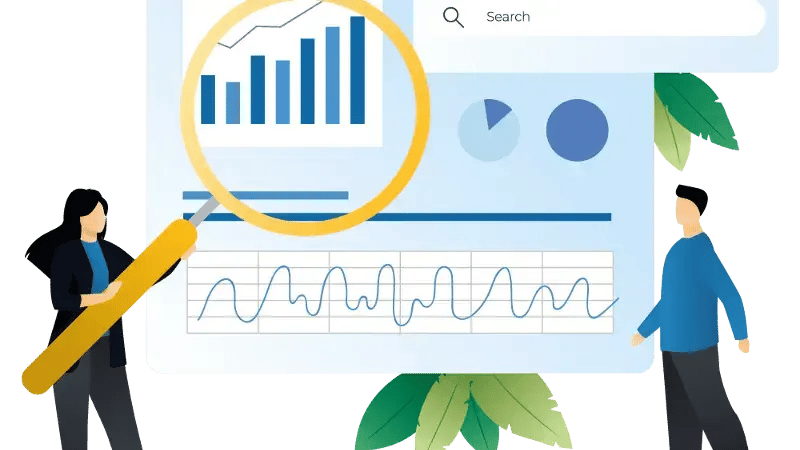Data-Driven Decisions: Measuring Podcast Success and Tracking ROI
Have you ever dreamt of launching your own podcast? With over 2 million podcasts and a staggering 4 billion monthly listeners worldwide, there's no denying the booming popularity of this audio medium. But beyond the excitement, a crucial question arises: how do you measure the success of your podcast?
Simply counting downloads isn't enough. That's why data-driven decisions are key. You need metrics that translate podcast performance into actionable insights and, ultimately, demonstrate a return on investment (ROI).
This concept of ROI is your golden ticket—the magic metric that proves your podcast's worth. By tracking the right data, you can show how your show generates leads, boosts brand awareness, or drives sales. But before diving into the numbers, let's set the stage for success.
Here's where SMART goals come in. These goal-setting powerhouses are Specific, Measurable, Achievable, Relevant, and Time-bound. They ensure your podcast goals are clear, well-defined, and directly linked to your overall business strategy. Whether you aim to increase website traffic, build a loyal community, or generate qualified leads, SMART goals will be your roadmap for measuring podcast success.
So, buckle up and get ready to navigate the exciting world of podcast analytics. We'll give you the tools and strategies to track your show's performance and prove its undeniable value.
Define Your Podcast Goals
Before diving headfirst into recording your podcast, it's crucial to define your goals. This clarity becomes your compass, guiding content creation and, ultimately, measuring success. So, let's explore some key podcast goals and the metrics that illuminate their achievement.
Monetization
Podcasts can be a powerful revenue stream. Here are some popular strategies:
-
Advertising: Dynamic ad reads, like those woven into the narrative of "My Favorite Murder," can feel seamless and engaging. Here, your key metric is the cost per mile (CPM)--the cost to reach 1,000 listeners.
-
Sponsorships: Partnering with relevant brands, like "How I Built This," does with product endorsements, allows for deeper integration. Track conversion rates to see how many listeners take action after hearing a sponsored message.
-
Premium Content: Offering exclusive bonus episodes or ad-free versions, like many popular shows, requires measuring subscriber numbers and recurring revenue.
-
Affiliate Marketing: Promote relevant products and track conversions (purchases) using unique affiliate links to understand the effectiveness of this strategy.
Brand Awareness
Podcasts are a brand-building powerhouse. A study revealed that a whopping 68% of listeners have purchased a product from a brand advertised on their favorite podcast! To quantify this impact, monitor:
-
Website Traffic: Promote your podcast on your website and track the influx of visitors after each episode release.
-
Social Media Buzz: Branded hashtags and mentions are goldmines. Use social listening tools to track the online conversation surrounding your podcast.
Lead Generation
Podcasts can be lead magnets. Take "Marketing School," a B2B podcast that uses valuable content to attract potential customers. Here are key metrics to watch:
-
Website Form Submissions: Include clear calls to action, like encouraging listeners to download a free e-book in exchange for their email address. Track website form submissions to gauge lead generation success.
-
Email Signups: Track how many listeners subscribe to your email list after hearing a podcast call to action. This helps build a targeted audience for future marketing efforts.
Community
Podcasts foster connection. 75% of listeners have joined online communities related to podcasts they enjoy. To measure community growth, track:
-
Social Media Group Engagement: Monitor the number of members joining your dedicated Facebook group or online forum, and their level of interaction within the community.
Remember, your podcast goals are unique. By aligning content with these objectives and tracking the right metrics, you'll be well on your way to proving the undeniable impact of your show.
Choosing the Right Metrics
Downloads are the first number most podcasters check. They offer a basic understanding of audience size, but are they the whole story? Absolutely not! Effective measurement delves deeper, revealing the quality of those listens and their impact on your goals. Here's where the right metrics become your secret weapon.
Beyond the Download
Downloads provide a starting point, but "engaged listens" paint a more vivid picture. Here's why:
-
Average Listen Duration: This metric reveals how long listeners tune in on average. A consistently high duration indicates captivating content that resonates with your audience.
-
Completion Rate: What percentage of listeners finish each episode? A high completion rate suggests your content is compelling and holds attention throughout.
Knowing Your Audience
Understanding your listener base is key. Demographics like age, location, and interests offer valuable insights:
-
Content Strategy: Imagine a finance podcast targeting millennials. Knowing this, you might focus on student loan advice or budgeting tips for young professionals. Tailoring content to your audience demographics ensures it resonates with their needs.
-
Ad Targeting: Demographics are gold for advertisers. A podcast on travel targeted towards Gen Z might attract sponsorships from travel booking apps or budget airlines.
Tools like Podkite or Listen Notes can provide listener demographic insights, helping you refine your content strategy and maximize advertising potential.
Website Traffic & Conversions
Podcasts can be traffic magnets for your website or landing page. Here's how to measure their impact:
-
UTM Parameters: When promoting your podcast online, use UTM parameters to identify website traffic specifically originating from your show. This isolates the podcast's influence on website visits.
-
Conversion Rate Tracking: The true magic lies in conversions. Did visitors who came from your podcast download an ebook, sign up for your email list, or make a purchase? Tracking conversion rates reveals the podcast's contribution to your bottom line.
The Power of Social Media
Social media is a launchpad for promoting your podcast and fostering audience interaction. Here's how to measure its impact:
-
Engagement Metrics: Shares, comments, and mentions are powerful indicators of audience engagement. A show with high social media engagement suggests a passionate and interactive listener base.
-
Social Listening Tools: These tools go beyond basic metrics. They track brand mentions across social media platforms, revealing how listeners discuss your podcast online. This offers valuable insights into audience sentiment and potential areas for improvement.
Choosing the Right Mix
The ideal metrics for your podcast depend on your goals. Remember, there's no one-size-fits-all approach. By combining download data with metrics like listener engagement, demographics, and conversions, you'll gain a holistic understanding of your podcast's performance and its alignment with your strategic objectives.
Advanced ROI Tracking Techniques
We've explored essential metrics for measuring podcast success. Now, let's delve into some advanced techniques to truly supercharge your ROI tracking:
Coupon Codes & Discount Offers
Imagine offering a unique discount code specifically for your podcast listeners. This allows you to directly track conversions tied to the show. For instance, an e-commerce brand could create a podcast-specific promo code to measure sales generated from the show.
Podcast-Specific Landing Pages
Landing pages are dedicated web pages designed to capture specific actions from visitors. Create landing pages mentioned on your podcast to track specific actions, like downloading an ebook or signing up for a webinar. Tools like Leadpages or Unbounce simplify this process.
Promotional Giveaways & Contests
Contests with podcast-specific entry methods can be a win-win. Here's how:
-
Entry Methods: Require listeners to follow your social media and tag a friend to enter. This boosts social media engagement and brand recall.
-
Tracking Engagement: Monitor how many people participate and analyze the data to understand audience reach and brand awareness.
Direct Listener Feedback
Don't underestimate the power of direct listener feedback. Here are two effective strategies:
-
Post-Episode Surveys: Include a short survey at the end of your episode. Ask listeners about their experience, content preferences, and suggestions.
-
Listener Call-to-Actions (CTAs): Encourage listeners to email you or leave voice messages with feedback. This provides qualitative insights that traditional metrics might miss.
Leveraging Analytics Platforms
Several advanced analytics platforms cater specifically to podcasts. These platforms offer in-depth insights into listener demographics, geographic location, and even listening habits (e.g., what time of day listeners tune in). By analyzing this data, you can refine your content strategy to reach the right audience at the right time.
Remember: Consistent measurement is key. Regularly track your chosen metrics and analyze the data over time. This allows you to identify trends, optimize your podcast for maximum impact, and ultimately, demonstrate a clear return on investment.
Industry Benchmarks & Metrics
So, you've chosen your metrics and implemented advanced tracking techniques. But how does your podcast stack up against the industry? Here are some benchmarks to provide context:
-
Downloads: Downloads vary widely depending on niche and promotion efforts. However, a well-established podcast in a popular category might average 10,000 downloads per episode, while a newer show in a specific niche could see success with 1,000 downloads.
-
Listenership: Industry benchmarks suggest a healthy average listen duration of around 60% of an episode's total length. Completion rates above 50% are considered positive signs of audience engagement.
-
Website Traffic: Conversion rates from podcast listeners to website visitors can vary greatly depending on the nature of your call to action (CTA). However, a 2-5% conversion rate is generally considered a good starting point.
-
Social Media Engagement: Engagement rates (likes, comments, shares) on social media posts promoting your podcast can vary depending on the platform. A good rule of thumb is to aim for an average engagement rate of 2-5% on your most relevant social media channel.
Remember, benchmarks are directional, not definitive. A smaller podcast with a highly engaged audience (reflected in metrics like completion rate and social media buzz) might deliver more value than a larger show with lower engagement.
The key is to track your own progress over time and set realistic goals. Focus on improving your own metrics episode by episode, and celebrate your progress. By consistently delivering valuable content and strategically promoting your podcast, you'll be well on your way to achieving your podcasting goals!
Analyzing Metrics & Taking Action
Gathering data is just the first step. The true magic lies in transforming numbers into actionable insights. Here's how to make the most of your podcast metrics:
-
Identify Trends: Track your metrics over time. Are downloads increasing steadily? Is listener engagement climbing? Recognizing trends allows you to see what's working and what needs improvement.
-
Benchmark Comparisons: While industry benchmarks offer a general reference point, compare your metrics primarily against your own historical data. This reveals your podcast's unique growth trajectory.
-
Content Refinement: Use listener demographics and feedback to refine your content strategy. Are you catering to your target audience's interests? Metrics can guide you toward creating content that truly resonates.
-
Optimize Calls to Action (CTAs): Analyze conversion rates to see which CTAs are most effective in driving website traffic or lead generation. Use this data to refine your CTAs and maximize listener action.
-
Strategic Experimentation: Don't be afraid to experiment! Test different episode formats, lengths, or guest appearances. Track the impact of these changes on your metrics to see what resonates best with your audience.
By consistently analyzing your metrics and taking decisive action, you'll transform your podcast into a strategic tool for achieving your goals. This data-driven approach ensures your podcast is not just entertaining, but demonstrably impactful.
Unveiling the ROI Potential of Podcasting
The power of podcasting is undeniable. However, true success hinges on measuring its impact and demonstrating a clear return on investment. By implementing the strategies outlined in this guide, you'll be well on your way to transforming your podcast into a strategic asset.
Remember, the right metrics unveil a treasure trove of insights. Use them to refine your content, optimize your CTAs, and experiment with confidence. As you consistently analyze and adapt, your podcast will evolve into a powerful tool for achieving your business goals.
Ready to unlock the true potential of your podcast?
Aspiration Marketing can be your partner in this exciting journey. Our team of marketing experts specializes in crafting data-driven strategies that maximize the impact of your podcast. Contact Aspiration Marketing today, and let's discuss how we can help you turn your podcast into a success story!
This content is also available in:
- German: Podcast-ROI: Erfolgsmessung mit Daten
- Spanish: Decisiones basadas en datos: medir éxito podcast y ROI
- French: Des données pour optimiser le ROI de vos podcasts
- Italian: Decisioni basate sui dati: misurare successo podcast e ROI
- Romanian: Decizii bazate pe date: măsoară eficiența podcastului, urmărește ROI
- Chinese: 数据驱动决策:衡量播客的成功并跟踪投资回报率










Leave a Comment